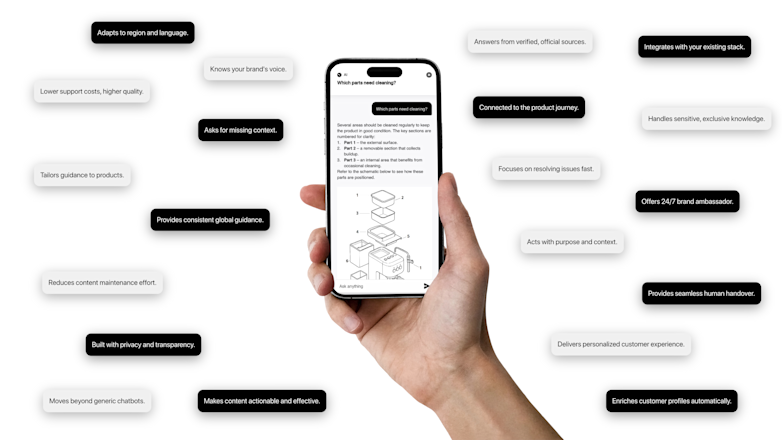
The business of selling products and services has always been a competitive sport in itself. Companies, merchants, and brands have always strived to outperform each other. One foundational element in the success or failure of any brand is the way its business decisions are made and the factors on which they’re based.
Traditionally, the methodology behind most business decisions has followed a general script. Experience in business dealings, market trends, and plain instinct has been the golden trio most CEOs and marketing directors have relied on to guide their business strategy.
While this approach has its advantages, this methodology is less applicable in today’s fast-evolving business environment. Relying on your cues, no matter how experienced you may be, is like trying to shoot a moving target with a blindfold.
The explosion of digital technologies, a pandemic that closed down the world for the better two years and changed consumer preferences. All these factors have transformed the way business is done around the globe. It should also alter our approach toward significant business decisions and marketing.
3 Data-driven trends changing the way we do business
Data is changing business trends on both ends: the consumer and the seller. Here are three data-driven trends creating a shift in the way we buy and sell:
Sustainability
The shift and increased awareness about how we consume natural resources and their impact on our planet aren’t new. Today’s consumer is better informed about what’s happening worldwide than at any other time in history.
Global warming and the sense that things need to change are now paramount. While it’s certainly a laudable undertaking on the consumer’s part, brands, too, need to modify their production, shipping, and advertising strategies to cater to this growing trend. Companies should be able to monitor their environmental impact and provide data showing that they are reducing their footprint.
E-Commerce
E-commerce is on the rise. Consumers prefer the convenience and variety of choices that ordering online offers them. But not all e-commerce is the same. The trend is shifting from ordering through websites towards mobile apps and click-throughs.
More than half of all online purchases happen through cellular devices. A data-driven approach can help companies maximize this trend in their favor. By understanding the avenues today’s consumer prefers, brands can make better investment and marketing decisions.

Experiential retail
This trend might seem counterintuitive in a world where everything is shifting to digital. While consumers prefer convenience, they also look for exciting new experiences rather than just consumable goods. That means good news for physical stores, marts, and boutiques.
Customers prefer good experiences over material goods and are even willing to pay a premium price. The experience of purchasing from your company is how consumers connect and relate to your brand. Niche businesses worldwide can capitalize on this trend by applying data-driven business strategies. Understanding customers is key to creating an unforgettable experience for them.
What is a data-driven company?
The definition of a data-driven company isn’t set in stone. Like other elements that make up a business, the way you collect, categorize, and utilize data will depend on many factors. It’s a simple methodology many successful brands use to improve their business practices.
Being a data-driven company means giving data and statistics a pivotal role in your business decision-making processes. Rather than shifting trends and gut feelings, it means relying more on facts and figures. Data-driven brands make assessments after consulting the collected data in any particular field.
This principle of using data to make decisions is implemented throughout the institution, from your product range to marketing strategies to processing practices across your assembly line. Data related to all significant components of the company is collected and analyzed. Necessary changes are implemented according to the results.
Treating data as a means towards a greater end rather than just a compilation of information makes a company data-driven. That’s the basic differentiating factor between a data-driven company and all other companies. Data-driven brands think of information as an asset with transactional value.
But don’t all brands produce data?
Every company has data, often tons of it. Customer feedback, usage reports, waste-supplies charts, market trends, and return rates of a specific product are all data. Most brands lack the knowledge and expertise to decode these data piles into usable information.
Having data and using data to your advantage are two completely different things. According to this report, about 60-70% of brands are missing out on the benefits data can leverage for them. That’s where Layerise comes in. With Layerise, the whole data management assignment is automated and outsourced.
Layerise computes consumer data and provides actionable insights you can apply in real-time. You can then use this information to elevate your brand and become a “data-savvy” company.
4 Reasons why data-driven companies perform better than others
More and more companies are now jumping on the data-driven bandwagon after witnessing how data-driven trends have upended entire industries. Some market watchers have estimated annual average growth of 30% for companies making business decisions based on data, statistics, and AI-processed information.
Those are some serious numbers we are talking about here. Here are four reasons data-centric companies continue to out-perform their competition:
1. Data-literate companies are better at customer retention
Ask any brand, and you will get the same reply: customer acquisition is a lengthy and expensive process. Getting a new potential consumer to give your product a try requires a good amount of marketing and creativity on your part.
Customer retention is how you maximize your return on this investment. According to this report, a mere 5% increase in customer retention can mean increased profits anywhere from 25% to 95%. While this might motivate any brand to work on their customer experience with renewed zeal, it’s no minor undertaking.
More than 65% of customers report switching brands because they were unsatisfied with the customer service. Statistics like these guide data-driven companies into prioritizing the experience they provide whenever a sale is made.
Customer interactions across the pre and post-sales funnel generate data. This data is then processed via machine learning to produce different categories of customer retention analytics.
These analytics are what help data-centric companies shape customer engagement and retention strategies. Here are some categories customer-data is processed and divided into:
Predictive Analytics: Figures that foretell customer behavior patterns.
Diagnostic Analytics: Figures collected for diagnosing and amendment any issues in your customer service.
Consumption Analytics: Figures associated with supply and demand based on past seasons and similar patterns.
Descriptive Analytics: Figures gathered after collection and analysis of detailed consumer demographics and preferences.
2. Data-driven companies are better at making accurate estimates
One huge advantage that helps data-driven companies operate better is that data gives you the tools you need to get out of the rat race. Brands often make reactive decisions based on the actions of their competitors that are, at times, impulsive.
Statistical data helps companies take a proactive approach toward all major decisions regarding their brand's direction. Instead of basing decisions on what the other brands are doing, data-driven brands are often the torch-bearers of the industry. That’s how data-centric companies stay ahead of the competition and help spearhead change and innovation.
But how are these data-driven brands able to take more leaps of faith that promote originality? It’s possible because they have predictive analytics backing up their decisions. Meaning that they use past data to make increasingly accurate predictions about upcoming patterns in retail and consumer behavior.
That approach helps them mitigate risk better than more traditional methods based primarily on guesswork. This evaluation helps one measure the power of predictive analytics: The market share of predictive analytics is estimated to be worth nearly $11 billion by the end of the current year.
3. Data helps brands improve manufacturing processes
The production practices you adopt to get your products from raw material to finished product can also be improved through data. Data-driven companies have better manufacturing processes and productivity. From maintaining a better supply chain to getting to the bottom of frequent returns.
Take manufacturing waste, for example. Waste by-products created during manufacturing processes are a huge global problem. Industrial waste was considered an unredeemable consequence of industrialization and progress for the longest time.
Data analytics help pinpoint where and how waste is generated across your assembly line. Insights like these enable you to make more informed decisions regarding the reduction and management of waste. Here are some other ways data-driven companies are staying ahead by boosting efficiency:
Creating and maintaining better supply chains
Maintaining more accurate records of mechanical failures. That helps keep equipment maintenance on track and cuts down on downtime.
Improving their production scalability capabilities.
Identifying their hot-selling and slow-selling products. Tracking production efficiency and identifying bottlenecks/ issues within the assembly line.
4. Taking a data-driven approach contributes to better work culture
What does it take to keep your team happy, motivated, and satisfied in their roles? Spoiler alert: it's not always more money. Data-driven companies use data and statistics like these to their advantage in all elements of their business.
It’s not just customer retention and manufacturing that helps these brands perform better; it’s the teams behind these companies. Here’s what data-driven companies do differently to cultivate a more productive work environment:
Fine-tune their recruitment regime: More than half of recruitment professionals agree that using data-driven strategies leads to more accurate and productive hiring. Data-driven companies have made talent recruitment a science. They screen all potential employees based on the specific requirements of the position they need to fill. That saves time, resources, and mistakes in the recruitment process.
Troubleshooting problems in the office: Data-centric brands understand the role of human resources in developing their brand. Data is collected through regular employee wellness checks and exit interviews. This data is then used to generate insights that maximize their team's productivity and identify problem spots within your company’s work culture.
Retarget spending: Spending too much on the annual office party? Your employees might appreciate a larger bonus more! Data insights help focus spending on areas most appreciated by your employees by helping management understand their needs better.
Better implementation of decisions: Data helps cultivate a more productive work environment by breaking the corporate hierarchy. You will have an easier time implementing data-based decisions rather than instructions based on speculation.
More autonomy at all levels: The availability of actionable data and figures also benefits your employees. It empowers them to make better decisions, have more autonomy over everyday tasks, and reduce errors.
How can you become a data-driven company?
The shift towards becoming more data-savvy can help your brand recognize new business prospects, reach your targets more efficiently, and improve operations across the board. Here are four key areas to focus on as you start your brand’s journey towards increased data literacy:
Your long-term strategy
That might seem counterintuitive. After all, isn’t big data here to help hone your strategic skills? Incorporating data into your brand is a long-term commitment. The evolution of your company’s decision-making process will not be instantaneous. Planning to plan and strategize better will help you:
Regulate the speed of change.
Build sustainable success.
On-board your team and align corporate goals.
Stay on track and persevere during challenging times.
Create a general game plan for introducing the new way of doing things.
Identify areas that can most benefit from taking a data-driven approach.
It is important to create a general long-term vision at this point and not have too many hard-set details. Remember to analyze and alter your strategy periodically as you move ahead with implementing it.
Your team’s approach to data
The incorporation of data analytics isn't enough to become a data-driven company. Promoting a data-driven culture within your organization is pivotal. Invest in your employee’s training by refining their skill-sets. Take a proactive approach towards improving your employees' data literacy and data proficiency.
Show them how data can help them improve their role within the company and make them indispensable to your brand. That will inspire new ways of using, collecting, and categorizing data. Encourage the development of analytical skills and data-based decision-making in your team members.
Your digital analytic tool-box
Artificial intelligence, machine learning, and cloud computing. There are many data-processing options out there. To become a data-driven brand, evaluate your needs and sign up for digital tools accordingly.
Any software or service you select to help you become a data-driven company will significantly impact your brand’s performance. Here’s a handy check-list to consider before you on-board any new software:
How does this new software align with your brand’s vision?
How will it help your brand achieve its objectives?
Do these new tools fit into your company’s existing digital framework?
How Layerise can help you become a data-driven company
Big Data has enormous potential. Leveraging this new business dynamic in favor of your brand can be overwhelming. Layerise offers data processing solutions custom-tailored for each business.
We help companies adopt better data-collecting practices that let them know who their customers are and how they use the product. By streamlining your product registration processes, we make it that much easier for you to collect data that helps you resonate better with your customers. Book a demo today and see how Layerise can help you take your company to the next level.
Learn how to collect valuable insights on your customers to sell even more.

How to Turn a New Obligation into a Growth with Layerise

A trusted, brand-safe AI assistant that knows your products, your customers and your content.



